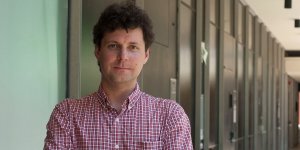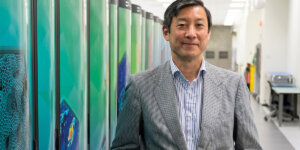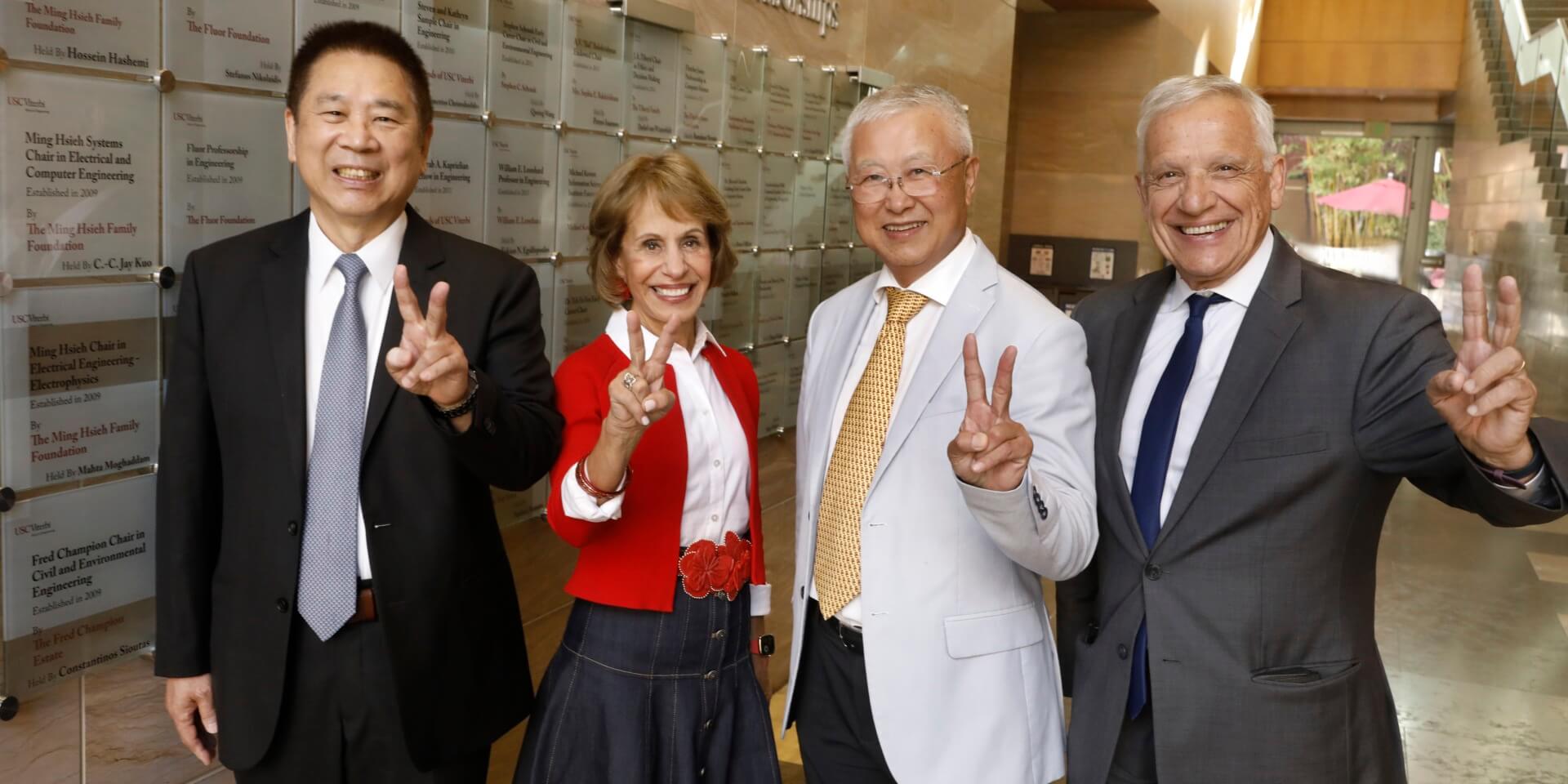
Jay Kuo (left) with USC President Carol Folt, Ming Hsieh, and Viterbi Dean Yannis C, Yortsos at the Ming Hsieh chair installation event Oct. 8. (Photo by Steve Cohn)
An extraordinary number was floated during the installation ceremony for C.-C. Jay Kuo, the new Ming Hsieh Chair in Electrical and Computer Engineering-Systems at USC Viterbi School: 178.
That’s how many Ph.D. students Professor Kuo has helped graduate during his 35-year career at USC. Several current and former students were in attendance inside the Ming Hsieh Boardroom at Ronald Tutor Hall on Oct. 8, as Kuo’s sterling achievements, and his good nature, were lauded by everyone.
“Today is a special day, as we celebrate the accomplishments of a truly exceptional individual,” Hsieh said. “Professor Kuo has distinguished himself as a global thought leader, award-winning researcher, brilliant academician, and mentor to so many. His contributions to visual computing, visual communications, machine learning, big data analytics, and artificial intelligence have shaped the world around us and have inspired past, current, and future Trojan engineers for decades.”
See our gallery of photos on Flickr.
For Hsieh, who graduated with a BS in electrical engineering from USC in 1983 and an MS in 1984, the endowed chair represents his latest gift that demonstrate his deep commitment to the Viterbi School and ECE in particular. A successful entrepreneur who launched a string of successful ventures, including Cogent Inc., the finger-print scanning company, Hsieh donated $35 million in 2006 to rename ECE the Ming Hsieh Department of Electrical and Computer Engineering. The endowment also funded ECE’s Ming Hsieh Institute, not to be confused with the $50 million Ming Hsieh Institute for Research on Engineering-Medicine for Cancer, founded in 2010. Hsieh already had endowed an ECE chair in Electrophysics, currently heled by Mahta Moghaddam.
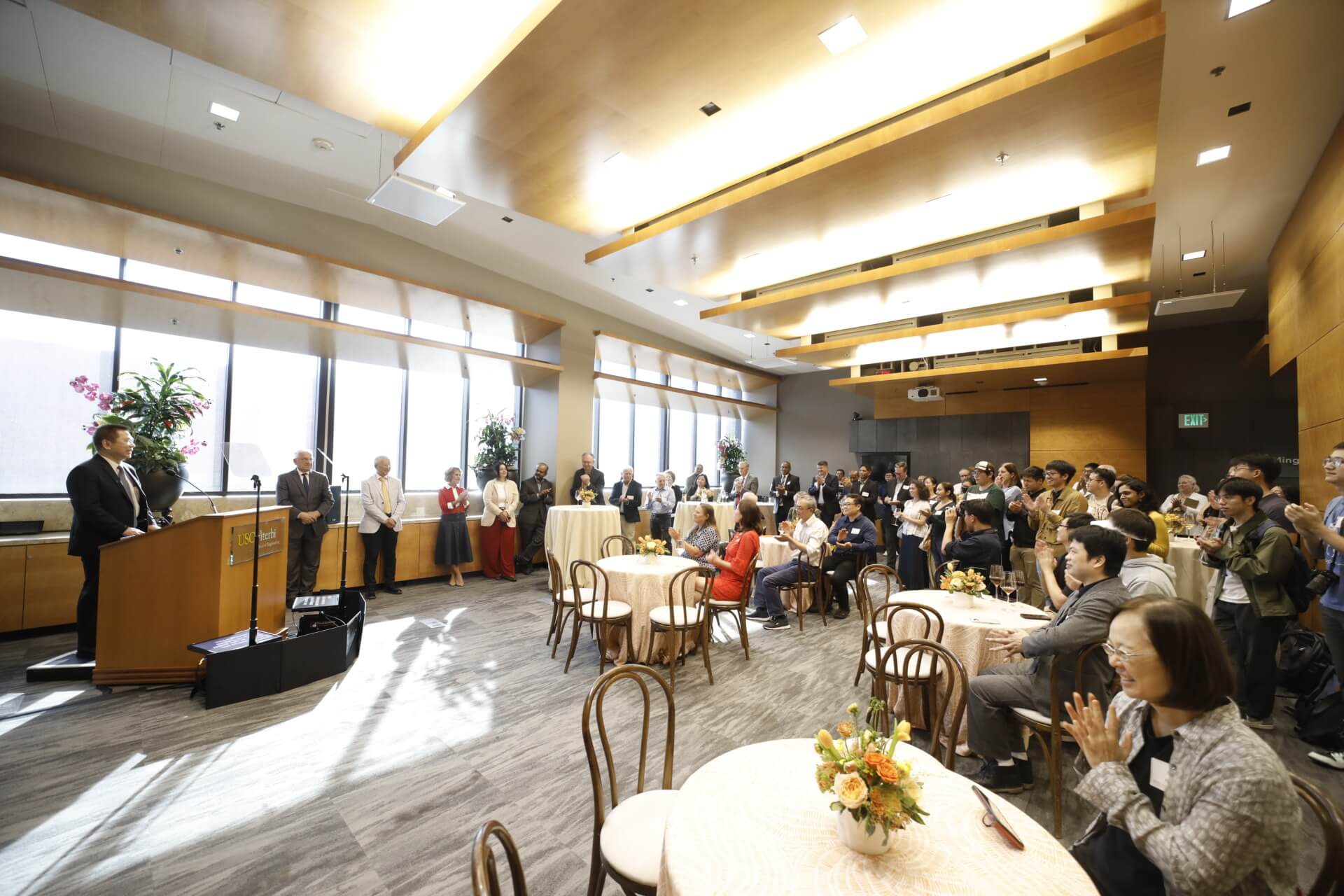
Jay Kuo (left) addressing the audience in the Ming Hsieh Boardroom at Ronald Tutor Hall. (Photo by Steve Cohn)
This year ECE unified into one department and is now one of the pillars of the recently unveiled USC Viterbi School of Advanced Computing.
USC President Carol Folt noted that, in 2015, when Hsieh was elected to the National Academy of Engineering, he said “education let me explore the world to fulfill my dreams.”
Hsieh’s largesse “has enabled students to explore the world and fulfill their dreams,” Folt added. “His dedication to ensuring that our engineering faculty and students will never lack resources is embodied by this chair for Jay.”
Kuo’s accomplishments are legion: A Distinguished Professor of Electrical and Computer Engineering and Computer Science, he is a fellow of the Association for Computing Machinery; the American Association for the Advancement of Science; the Institute of Electrical and Electronics Engineers; and the National Academy of Inventors.
“His contributions within the areas of signal/image analysis, image/video coding and multimedia content/rights management are as legendary as they are transformative,” said Viterbi School Dean Yannis C. Yortsos.
Of the 178 Ph.D. students Kuo has taught, Yortsos said: “Can you believe that? These students could make up a whole school of engineering!”
“We sweat a lot together, for tiny progress … and bigger breakthroughs.” — Jay Kuo, on working with his students
Gaurav Sukhatme, the Executive Vice Dean of the Viterbi School and the inaugural Director of the School of Advanced Computing, said Kuo is “a living legend” and that his achievements are “an academic colossus.” “You go to some parts of the world, and your calling card is, ‘I know Jay Kuo.’ ”
Folt mentioned Kuo’s 2021 Technology and Engineering Emmy Award, which he won for “Development of Perceptual Metrics for Video Encoding Optimization,” and his recent work at USC on measuring the quality of compressed video, developing a tool for Netflix called Video Multimethod Assessment Fusion.
“Jay’s work with Netflix on this problem has saved countless man hours, enabling the global-leading streamer to entertain the world as never before,” she said. “He has also been dedicated to making artificial intelligence systems that are easier for people to understand and are also more sustainable.
“One concern about AI is its large carbon footprint from its high energy use, impacting global warming and climate change. To address this problem, Jay and his students developed a new model of machine learning called ‘green learning.’ ”
Kuo said the honor was “a highlight of my 35-year career at USC. I have great respect for Ming’s humility and warmth. Having a chair with his name is very precious to me.”
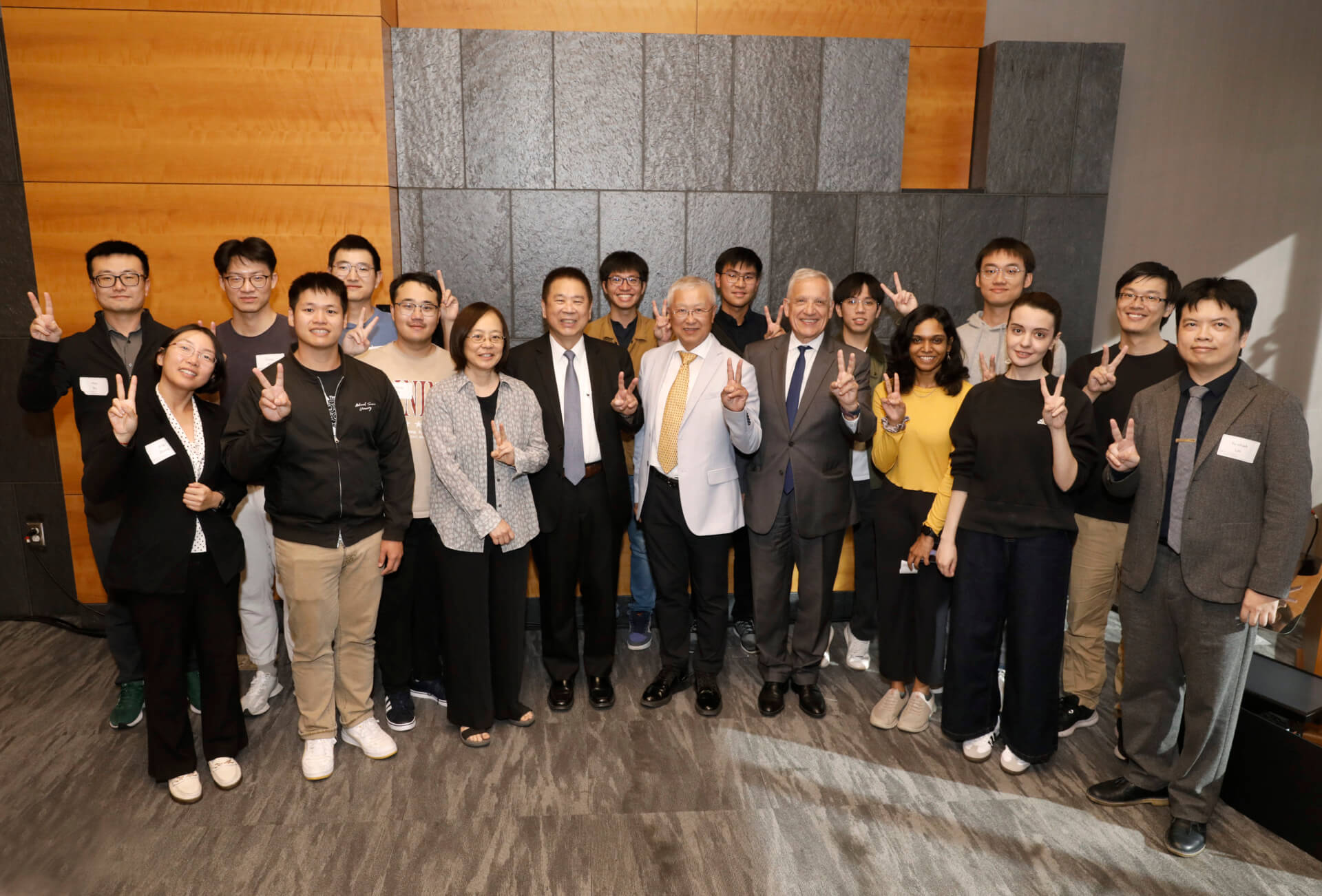
Ming Hsieh (center, in gray jacket) with Jay Kuo to his right, Jay’s wife to his right, and (to Ming’s left) Viterbi Dean Yannis C. Yortsos, surrounded by some of Jay’s current and former students. (Photo by Steve Cohn)
He has cherished his time mentoring students — not only those 178 who have graduated, but 20 more still at USC. “We sweat a lot together, for tiny progress … and bigger breakthroughs,” he said.
Several of those current and former students came to the ceremony. Jing Zhang was a student of Kuo’s from 2008 to 2013, researching computational and statistical modeling of RNA-seq data. She now runs her own lab as an assistant professor of computer science at UC Irvine.
“In every challenge I face, I am reminded of the invaluable lessons I learned from Dr. Kuo — his profound academic insight, exceptional management skills, and, above all, his passion for both science and education. His influence continues to shape my career and guide me in building my own path in academia.”
Published on October 28th, 2024
Last updated on October 28th, 2024





